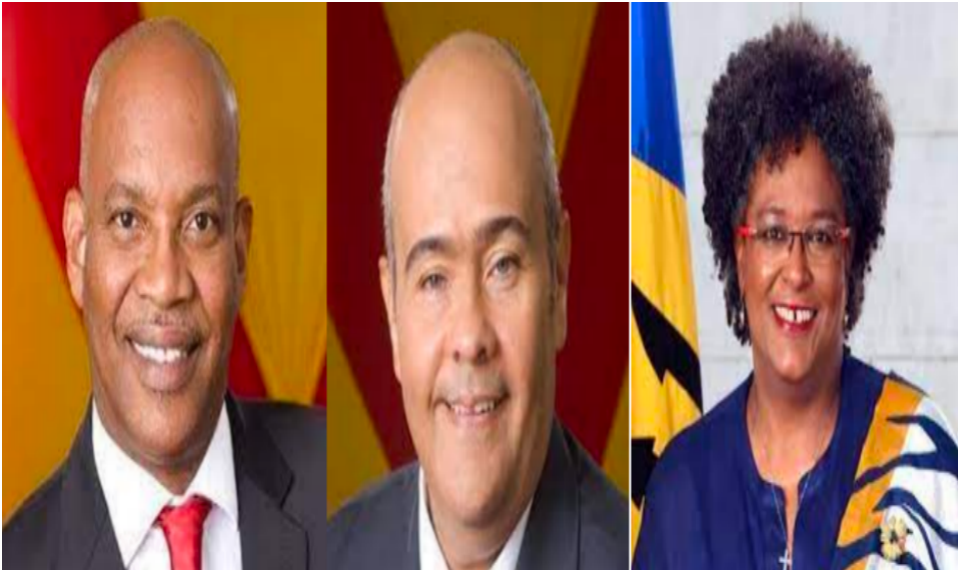


Over the last couple years BU has articulated, we hope dispassionately, on the issue of the open immigration policy which was practiced by the previous government. At no time have we supported xenophobic behaviour or bigotry in the ensuing discourse. We have simply held a position that while Barbados should be committed to its obligations under the Treaty of Chaguaramus, it does not mean that our borders should be assaulted by all and sundry seeking the proverbial streets lined with gold at the expense of the vision which Barbadians have held-up for itself through the years. BU readers can do a search using the keyword ‘immigration’ to access the many blogs posted on this subject.
The conspiracy which has emerged across the region to spin a false position in response to Prime Minister David Thompson’s Ministerial Statement after he announced an amnesty for CARICOM nationals, has been blatant and symptomatic of a political and social immaturity.
Any interested observer of regional affairs would conclude that the issue of immigration is a topical one. Since the announcement by Thompson of the amnesty the issue has become accentuated. In the Advocate Newspaper of 14 June 2009 a Mr. Lindsay Holder was as clear as anyone can be in elucidating on the immigration issue which Barbados and the region is currently battling, he did so without the use of jargon, fuzzy logic, ideological or jingoistic biases. We highly commend the Advocate Newspaper for giving voice to this important issue which is being manipulated by politicians, academics, Fourth Estate and prominent and other influential persons in Barbados and across the region.
As the popular saying goes we will probably not agree with the many persons who submit articles to be published on BU, but we will always defend their right to be heard. In recent days BU in this vain would have published two submissions by George Braithwaite, a PhD Candidate in International Politics researching the topic of immigration in the region.
In the Sunday Sun of 14 June 2009 the headline Bad Rep, the Opposition Leader of Barbados Mia Mottley was highly critical of the Barbados government’s new immigration policy. She suggested that Barbados is likely to suffer a backlash from some Caricom members as a result. The point which continues to elude Mottley is the fact that managing our borders is a matter of sovereignty and MUST not be dictated by those who themselves have done a muck-up job of managing their own countries.
Increasingly in recent weeks one of the characteristics which defines an American has been been flickering in the minds of the BU household. The best definition we could find of what it means to be an American is an unswerving support and devotion to our flag, our elected officials, our men and women in uniform. For others, patriotism means criticizing politicians when they take America in the wrong direction, protesting in the streets—sometimes even burning the flag. Patriotism also has complex ties to citizenship, race, and nationalism, as well as to the ways in which we remember our wars and the people who fought in them – University of Chicago.
Barbados for all that it has accomplished, and which has led to it being considered the island of opportunity in the region, has been allowing slowly but surely, a conspiracy by some to take root to undermine the Bajan success. The issue which Barbados faces is not honouring its obligations under the Treaty of Chaguaramus, but one of ensuring that it effectively manages the country in the way that it has successfully done in a post-independence era. Many of the countries in the region who are crying foul of the new immigration policy i.e. Guyana and St. Vincent would do well to use Barbados as a model to their own revival of political and economic fortunes.
The two stakeholders in Barbados we are most disappointed are the Opposition Barbados Labour Party and the Fourth Estate. In the face of a regional conspiracy to undermine the reputation and goodwill of Barbados which was built under the astute management by successive governments, we have a situation now where for political expediency the government in waiting is safeguarding it legacy by confusing the illegal immigration problem faced by Barbados by masking its position in the known challenges of implementing a political and economic union. In another place BU used the analogy that if CARICOM/CSME were a regional company its profitability would hinge on an efficient implementation of a vertical integration strategy. CARICOM conversely has not done enough to strengthen and harmonize key institutions and procedures.
The Fourth Estate in Barbados has aided and abetted the vulnerable position which Barbados now finds itself by being unpatriotic in the positions is has taken, the Nation Newspapers and Voice of Barbados the main culprits. The media in Barbados has been generous in giving a voice to an anti-government sentiment concerning the immigration issue. The populist view in Barbados is a commonsense view that the previous government’s position of allowing unskilled people whether from Guyana, Jamaica and elsewhere is untenable. Even the other ethnic groups from Europe and China have come under the microscope. Talk show host Dennis Johnson always uses the example that all are welcome to Barbados but it must be done under agreed terms. In other words if you are invited to someone’s home one still needs to knock on the door and remain seated in the sitting room before being invited to the bedroom. After all it is our home and respect and common courtesies are due!
The fact that our Fourth Estate in Barbados gives a generous voice to Rickey Singh, who continues to bite the hand which has fed him for so many years, and not give EQUAL voice to other views which represent ordinary Barbadians is disgusting. Bare in mind that Singh has not used his pen to expose the atrocities currently at play in Guyana.
The fact that the Fourth Estate ignores the hatchet job being done on the good reputation of Barbados by Singh, Saunders et al who are syndicated columnists and remain passive to respond is an indictment on their duty to accurately report the views of ordinary Barbadians who are its supporters.
The fact that the Guyanese media has been freely publishing articles which are unfairly critical of Barbados’ immigration policy with no response from the Barbados media except to cherry pick those opinions which support narrow political views is hypocrisy of a high level.
The fact that the media in Barbados continues to blackout reporting on the political and racial tensions in Guyana which have spurred an exodus of Guyanese to swarm the smaller Caribbean nations to the North is journalistic dishonesty.
The fact that the media has ignored the commonsense concern of ordinary Barbadians that learned behaviours derived in a Guyanese environment rifted with racial conflict may pose issues to the stable host population of Barbados is ignorant.
The fact that the Fourth Estate and the Opposition Party of Barbados led by Mia Mottley sit passively and allow Jagdeo to cherry pick the issue of immigration to undermine the earned good reputation of Barbados is unpatriotic. The known political and racial conflict in Guyana and the accommodation of unsavoury people like Roger Khan et al which have been left silent represent a betrayal of Barbados and a usurping of their core responsibilities.
The Chairmanship of CARICOM will be passed to Jagdeo in July, he will without a doubt use tit o promote his narrow interest. It maybe the last straw which will break the back and or setback the regional initiative of CARICOM and the CSME.




The blogmaster invites you to join the discussion.